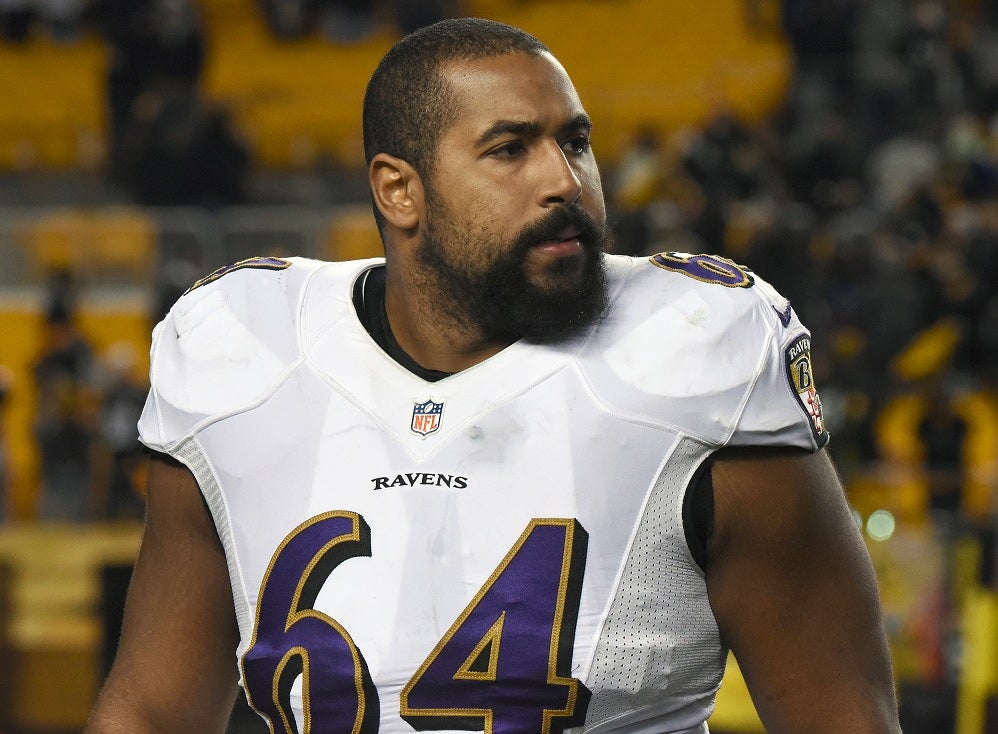At age 26, Ravens’ John Urschel retires from NFL to pursue PhD in maths at MIT
The 26-year-old has retired after three years with the Baltimore Ravens

Something about playing professional football does not add up anymore for Baltimore Ravens offensive lineman John Urschel.
Just two days after a new study revealed increasing evidence connecting the degenerative brain disease chronic traumatic encephalopathy to the highest levels of the game, the 26-year-old retired.
The Ravens, where Urschel played for three seasons, made the announcement online.
"This morning John Urschel informed me of this decision to retire from football," Coach John Harbaugh said in a statement. "We respect John and respect his decision. We appreciate his efforts over the past three years and wish him all the best in his future endeavors."
Urschel, who has not publicly commented on his decision, has a second career lined up. A doctoral candidate in mathematics at the Massachusetts Institute of Technology, Urschel already has nine published or accepted research papers to his name, according to the school's magazine MIT Technology Review. His specialties include discrete Schrödinger operators, high dimensional data compression, algebraic multigrid and Voronoi diagrams.
"I have never had a student like him," Prof. Ludmil Zikatanov, who taught Urschel as an undergrad and master's student at Penn State, told The Washington Post last year.
Urschel's said in the past that he envisions a "bright career" for himself in mathematics. He's also said, however: "I love hitting people."
He's never been shy about talking about the possible risks to his brain from playing football, and in fact, in a 2015 essay for the Players' Tribune, said he envied Chris Borland, who retired from the NFL at age 24 over concerns about CTE.
"Objectively, I shouldn't [play football]," Urschel admitted in his essay. He added, though, that his passion for the game overrode the possible risks.
"There's a rush you get when you go out on the field, lay everything on the line and physically dominate the player across from you," he wrote. "This is a feeling I'm (for lack of a better word) addicted to, and I'm hard-pressed to find anywhere else."
It's unclear whether Urschel, who participated in all the team's training sessions during the offseason, simply no longer feels that same passion, or if he now determined the risk to outweigh his love of the sport.
Urschel and his agent Jim Ivler did not immediately return The Post's requests for comment.
If it's latter, however, it would hardly be a surprise following the release of a study this week conducted by researchers at Boston University School of Medicine and the VA Boston Healthcare System. Researchers studied the brains of 112 former NFL players who died in recent years and diagnosed 111 with CTE.
"Obviously, this doesn't represent the prevalence in the general population, but the fact that we've been able to gather this high a number of cases in such a short period of time says that this disease is not uncommon," neuropathologist Ann McKee told The Post's Rick Maese this week. "In fact, I think it's much more common than we currently realise. And more importantly, this is a problem in football that we need to address and we need to address now in order to bring some hope and optimism to football players."
While Urschel is the youngest player to retire this week to continue to pursue his PhD, he's not the only one. On Tuesday, 31-year-old wide receiver Andrew Hawkins, who had signed a one-year deal with the New England Patriots, decided to end his career as well. He also pledged to donate his brain to CTE research in the future. In the meantime, Hawkins, who recently earned his masters from Colombia University, said he plans to pursue his doctorate in business and economics.
Copyright The Washington Post
Join our commenting forum
Join thought-provoking conversations, follow other Independent readers and see their replies
Comments